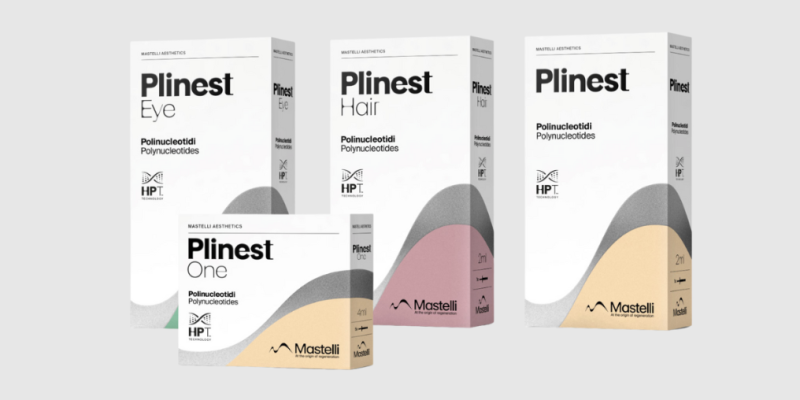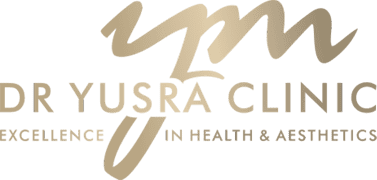Polynucleotides: The Next Frontier in Skin Rejuvenation
Posted on 1st August 2025 by Olivia

The question on everyone’s lips: Are polynucleotides worth it?
The short answer, yes.
If you’re looking for a regenerative, non-invasive way to restore skin health, improve elasticity, reduce inflammation, and promote natural collagen production, polynucleotide therapy is rapidly proving itself to be one of the most exciting advancements in aesthetic medicine today.
At Dr Yusra Clinic, our evidence-led approach means we’re only interested in treatments that deliver, safely, effectively, and with natural-looking results. Polynucleotides meet every one of those benchmarks. Here’s why this therapy is quietly (and quickly) transforming the way we treat skin ageing.
What Are Polynucleotides?
The Building Blocks of Cellular Repair
Polynucleotides are purified DNA fragments, derived from natural sources. Think of them as a cellular instruction manual, they signal your body to regenerate, repair, and revive skin tissue at the deepest level.
How They Differ from Traditional Skin Boosters
Unlike hyaluronic acid, which hydrates and volumises, polynucleotides work deeper, acting as biostimulators. They encourage fibroblast activity (your collagen-building cells), promote angiogenesis (new blood vessel formation), and directly support tissue regeneration.
Where Polynucleotides Come From
Most polynucleotide injectables are derived from salmon DNA, an incredibly compatible source due to its bio-similarity to human DNA. Once purified, the DNA is injected into the skin to kickstart the regenerative process.
The Science Behind Polynucleotide Treatments
Cellular Regeneration and Fibroblast Stimulation
When injected, polynucleotides stimulate fibroblasts to increase collagen and elastin production. This leads to firmer, smoother, and more resilient skin over time.
Anti-Inflammatory and Antioxidant Effects
They reduce oxidative stress, soothe inflamed skin, and encourage tissue oxygenation, making them ideal for redness, rosacea-prone complexions, and healing damaged skin barriers.
Skin Quality, Elasticity, and Barrier Repair
Over the course of 2–3 sessions, most patients report visibly brighter, plumper, and healthier skin. Unlike instant-volume treatments, polynucleotides offer gradual, sustained results with compounding benefits.
Benefits of Polynucleotides for Skin Rejuvenation
Ideal for Ageing, Thinning, or Damaged Skin
This treatment supports long-term skin health, especially in mid-30s to 70s patients showing signs of collagen depletion, crepiness, or dullness.
Suitable for Sensitive Skin and Post-Procedure Healing
Polynucleotides are well-tolerated and anti-inflammatory, making them a popular post-laser or microneedling add-on to enhance healing.
Natural-Looking Results and Progressive Improvements
Unlike dermal fillers, which give immediate structural lift, polynucleotides work subtly. Over time, skin becomes more hydrated, even-toned, and elastic, with no risk of puffiness or overfilled appearance.
When to Expect Visible Changes
Patients typically begin noticing improvements 3-4 weeks post-treatment, with optimal results after 2–3 sessions spaced four weeks apart.
Polynucleotides vs Other Injectable Skin Boosters
Polynucleotides vs Hyaluronic Acid Skin Boosters
Hyaluronic acid hydrates. Polynucleotides regenerate. Both are valuable, but for those seeking biological skin improvement rather than temporary hydration, polynucleotides offer a more comprehensive solution.
Are Polynucleotides Better Than Profhilo or PRP?
We only use highly purified technology polynucleotides by Mastelli, which has over 90 publications and 70 years of clinical use. It’s safety profile is unmatched and is backed by science. These are the Plinest and Newest range and the best and safest on the market.
Profhilo excels at hydration and subtle lift. PRP uses your own plasma to encourage repair. Polynucleotides sit comfortably between the two, offering regenerative benefits without the variability of PRP or the transience of HA-based boosters.
Ideal Combination Protocols for Enhanced Results
At Dr Yusra Clinic, we often pair polynucleotides with microneedling, exosomes, or even light laser treatments to maximise skin healing and rejuvenation. It’s part of our stacked treatment approach for long-lasting outcomes.
What to Expect During Your Treatment at Dr Yusra Clinic
Consultation and Custom Treatment Plan
We begin with a personalised skin assessment to determine your specific needs. From there, a bespoke polynucleotide protocol is created, often as part of a broader skin strategy.
The Procedure – What It Feels Like
Using ultra-fine needles or a cannula, the polynucleotides are injected into the dermis. Some patients may feel a light sting or pressure, but discomfort is minimal.
Downtime, Side Effects, and Aftercare
There may be mild redness or swelling for 24-48 hours. Bruising is uncommon. We advise avoiding intense heat or vigorous exercise for 24 hours post-procedure.
Who Are Polynucleotides Suitable For?
Late-20s to 70s Skin Seeking Natural Regeneration
This treatment is ideal for those looking to age well and improve skin health, rather than transform. It supports your skin’s biology, rather than trying to override it.
Patients Concerned with Scarring, Redness, or Skin Laxity
Polynucleotides are frequently used for skin that has been compromised, by acne, rosacea, or even past sun damage. They help rebuild and reinforce without aggression.
Skin Prep or Recovery Support for Other Treatments
They’re brilliant as a priming step before fractional laser or RF, and equally helpful during recovery phases. A versatile, supportive treatment that strengthens the skin’s response to other procedures.
Why Choose Dr Yusra Clinic for Polynucleotide Treatments?
Medically Led, Results-Driven Care
All treatments are delivered by our expert team of medical professionals. Every protocol is tailored and underpinned by science, not trends.
Award-Winning Aesthetic Excellence
Dr. Yusra Al-Mukhtar has been recognised as the Best Medical Aesthetic Practitioner of the Year for three consecutive years. Her approach blends anatomical understanding, advanced training, and patient-centred care.
Trusted by Patients Across the UK
With clinics in Manchester, Liverpool, and London, and a loyal patient base who value natural results, our reputation is built on safety, education, and real-world outcomes.
Book Your Polynucleotide Consultation Today
Polynucleotides aren’t just a trend, they’re the future of skin regeneration. If you’re ready to explore advanced, biology-led skin restoration, we invite you to book your consultation at Dr Yusra Clinic today.
Award-Winning Aesthetic Excellence
Dr. Yusra Al-Mukhtar has been recognised as the Best Medical Aesthetic Practitioner of the Year for three consecutive years; a prestigious honour awarded based on exceptional clinical expertise, patient outcomes, safety standards, and dedication to aesthetic excellence. She is also the first medical practitioner to be inducted into the Aesthetic Medicine Wall of Fame, a landmark achievement that reflects her leadership and influence in the field of aesthetic medicine in the UK and internationally.
At Dr Yusra Clinic, we are equally proud to be named Best Aesthetic Clinic in the North of England and Best Clinical Team, both three times, acknowledging our commitment to the highest standards of patient care, medical ethics, and outstanding treatment results.
FAQs – Polynucleotides
What are polynucleotides for skin?
They are DNA-based fragments that stimulate collagen, repair damaged skin, reduce inflammation and promote elasticity.
Are polynucleotides better than Profhilo?
They serve different purposes. Polynucleotides regenerate at a cellular level, while Profhilo hydrates and firms. Both can be used together.
How many sessions do I need?
Typically, 2–3 treatments spaced 4 weeks apart, followed by maintenance every 6-12 months.
Is there any downtime?
Minimal. You may experience slight redness or swelling for a day or two.Are polynucleotide injections safe?
Yes. They are biocompatible, non-allergenic and widely studied for regenerative purposes.


